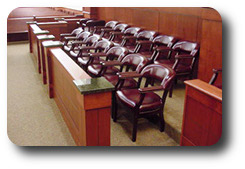Sunday 1 November, 9.45am until 10.30am, Henry Moore Gallery Breakfast Banter
 Earlier this year a criminal trial took place without a jury for the first time in an English Crown Court. This was made possible by a change to the law in 2007, one of several key changes in recent years to the way trials are conducted in the UK. The anonymity of witnesses is now enshrined in statute, the family courts have widened their doors to the public, and a series of high profile cases has raised questions about the extent to which the media may negatively influence trial proceedings. Like other changes, the proposal to do without juries in some cases is presented as a practical response to changing circumstances. Does an expansive media environment make impartiality impossible, for example? Or are some cases too complicated for ordinary citizens to understand?
Earlier this year a criminal trial took place without a jury for the first time in an English Crown Court. This was made possible by a change to the law in 2007, one of several key changes in recent years to the way trials are conducted in the UK. The anonymity of witnesses is now enshrined in statute, the family courts have widened their doors to the public, and a series of high profile cases has raised questions about the extent to which the media may negatively influence trial proceedings. Like other changes, the proposal to do without juries in some cases is presented as a practical response to changing circumstances. Does an expansive media environment make impartiality impossible, for example? Or are some cases too complicated for ordinary citizens to understand?
Critics argue that the right to be tried by a jury of one’s peers is essential to justice. The principle that we should be judged by our fellow citizens – people like us – rather than patrician and often aloof judges has long been cherished as the mark of a free society. But is the idea that justice is best arrived at by ‘twelve good men and true’ (or even women) simply unrealistic in trials involving ever-more complicated legal, financial and scientific details? Is justice best left to the experts? Or should society’s notions of a fair trial not be chopped and changed in response to problems faced by our justice system? Should we feel protective over the traditional rights of the courtroom? Do we need further legislation to control what information reaches a jury, rather than abolishing juries altogether? What changes if any should be made to the jury system? How is the administration of justice changing, and is it still fair?
 | Marcel Berlins columnist, Guardian; writer & presenter, Law in Action; visting professor, media law, City University and Queen Mary's College |
 | Rob Lyons science and technology director, Academy of Ideas; convenor, IoI Economy Forum |
 | Marguerite Russell barrister, specialising in human rights and criminal law; founder member, Garden Court Chambers |
| Chair: | |

|
Luke Gittos
criminal lawyer; director of City of London Appeals Clinic; legal editor at spiked; author, Why Rape Culture is a Dangerous Myth: From Steubenville to Ched Evans |
The jury system is threatened by the internet generation, who no longer get their information from listening to people speaking, the Lord Chief Justice warned yesterday.
Frances Gibb, The Times, 21 October 2009The legal standard for dishonesty needs to be reviewed because jurors’ widely different views may be affecting the outcome of trials, criminologists say.
Mark Henderson, The Times, 8 September 2009Should we be worried? Is this yet another instance of the threatened erosion of the right to jury trial, as evidenced by the government's attempts – so far resisted – to withdraw long fraud trials from juries?
Marcel Berlins, Guardian, 22 June 2009In court, the jury system works. Why not bring unelected people into public bodies too?
Julian Glover, Guardian, 20 May 2009Roy Amlot, QC, a former Bar Council chairman, argues that independent juries are essential to the democratic process
Roy Amlot, The Times, 1 July 2003The jury system is seen as a pillar of English justice. But does that mean we can't challenge its decisions?
Louis Blom-Cooper, Observer, 21 October 2001What would become of the criminal trial if the jury was taken out of the picture? This is precisely what occurred in Northern Ireland in 1973, after a Commission recommended that cases connected with the 'troubles' be tried by a judge alone.
John Jackson and Sean Doran, Oxford University Press, 1995
We have been debating the use of juries in complex fraud trials on and off for 20 years. However, the discharge of the jury in the Jubilee Line corruption trial, after sitting for 18 months without returning verdicts, has put the question back under the spotlight.
George Staple QC, The Barrister